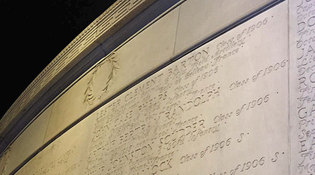 loading
loading
Old YaleThe first Yale man dead in World War IArthur Bertram Randolph ’06 died before America entered the war. Guest columnist Stuart R. Turnbull is an emeritus fellow of St. Peter’s College at Oxford University.  Mark Zurolo ’01MFARandolph, whose name is shown here in Yale’s Memorial Hall, was a US citizen who joined the British Army. View full imageIn September 1915, elements of the German Sixth Army occupied both Lens and Loos, in northern France. Some distance to the west were the trenches occupied by part of Britain’s New Army. The New Army was literally new, a volunteer force built up after the original British fighting force on the Continent had been effectively wiped out. One of the volunteers in the replenished army was Lieutenant Julien Randolph, commanding officer of a platoon of about 60 men in the First Battalion of the Welsh Guards. He was a US citizen and a Yale alumnus. Julien Randolph had been born Arthur Bertram Randolph in 1882 in Douglaston, New York, to an American mother—Edith Sybil May, a New York belle in her youth—and a British father. Arthur spent his formative years in New York. His father died in 1885, and in 1896 his mother married William Whitney, Class of 1863. Arthur graduated from Groton in 1901 and then lived briefly in England before returning to the United States, taking the Yale entrance exam, and joining the Yale Class of 1906. Perhaps Whitney’s own link with Yale influenced his stepson’s college choice, but if so, the influence didn’t last. Randolph left school during his freshman year and settled in England. Soon after the outbreak of war in August 1914 Randolph joined the British Army. He used the name Julien, although there is a handwritten note in his pay book stating that he was also known as Arthur Randolph. Why did he give a different name? We can only speculate. All promotions in the British Army are reported in the London Gazette—as his, to lieutenant, would be reported in 1915—so it’s conceivable he feared that members of the US embassy would find out, and not be pleased, that a US citizen had sworn allegiance to a foreign crown. (Indeed, in World War II it would be a criminal offense for Americans to join the British armed forces.) Arthur or Julien, in September 1915 he found himself part of the Battle of Loos—a battle the British did not want to fight. The New Army had had insufficient time to train and did not have sufficient heavy artillery or ammunition. Yet the British agreed to the French request for an attack. The Battle of Loos took place between September 25 and October 13, and would be a costly failure: the Germans contained the British and French advances, and casualties on both sides were monstrous. At the start, things seemed to go well. The British took the Germans’ frontline trenches and made good progress towards their second line. But the advance slowed, and by the end of day most of the British were stuck between the first and second lines, with very little cover. They had lost 6,350 men killed and three times that number injured. On the second day the Germans retook almost all of the British gains. On the third day, September 27, the British decided to attack an area dubbed the Chalk Pit and, if the offensive was successful, to attack a long ridge they called Hill 70. The first attack was only partially successful, so an order was sent to cancel the second. But the order never got through to the Welsh and Grenadier Guards. They began their advance on Hill 70 at about 6:30 p.m.; by the time it faltered, most of the Third Company of the Welsh Guards had been killed. Randolph was among them. His death was an example—one of hundreds of thousands—of the futility and waste of the Great War. Randolph is commemorated—as “Randolph, J.”—on one of the 134 panels in a British military cemetery near Lens that list 20,360 soldiers who have no known grave. He is also listed on the wall of Yale’s Memorial Hall, the earliest of the World War I dead. His rank is incorrectly given as first lieutenant, but his name is correct: Arthur Bertram Randolph.
The comment period has expired.
|
|